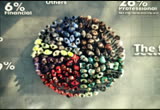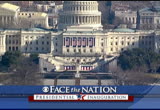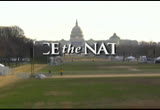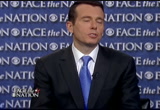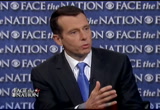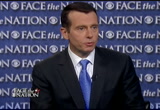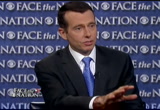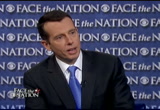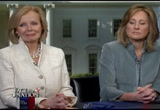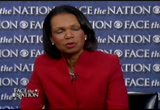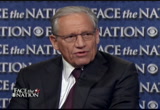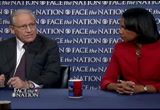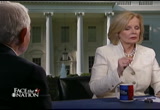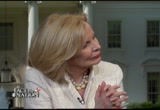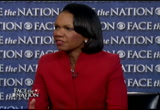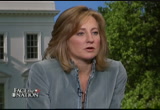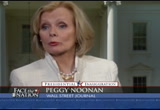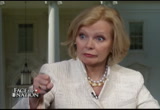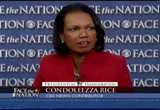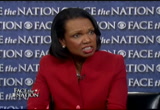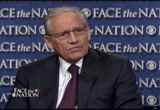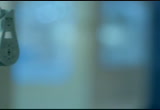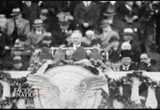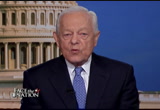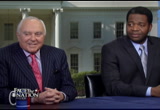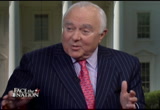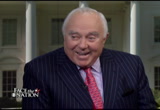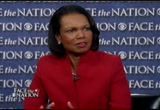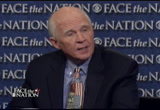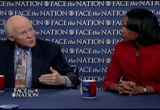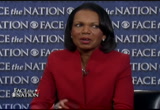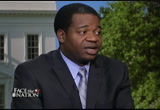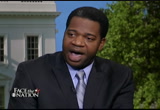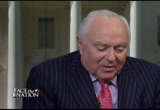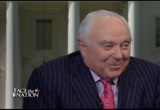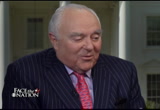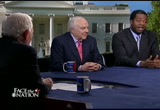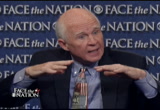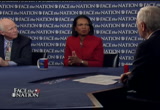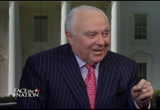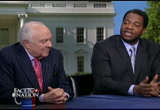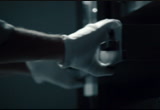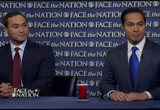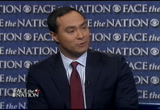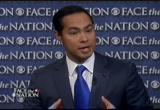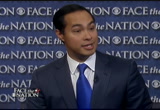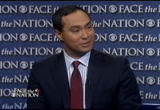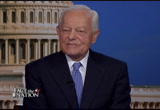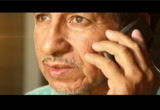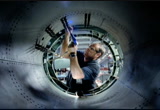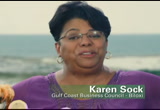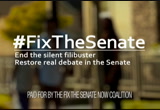tv Face the Nation CBS January 20, 2013 10:30am-11:30am EST
10:30 am
>> today on "face the nation," barack obama and the second time around. they're putting the final touches on the platforms and podiums, rehearsals are under way, and vice president biden has already taken the oath. >> so help me god >> that's because the constitution says the oath must tape on january 20. the president takes it at noon, then all of it will be repeopled during public ceremony tomorrow. but in a capitol divided, what next? no one has a for the handle on what the president wants to do than white house adviser david plouffe, who joins us this morning. monday, as martin luther king
10:31 am
jr.'s birthday, also, so we'll talk about all of it with the former secretary of state condoleezza rice. bob woodward of the "washington post." former clinton aid, dee dee myers of "vanity fair." conservative columnist peggy noonan of the "wall street journal." joe califano, once an aid to lyndon johnson. taylor branch, author of a new book on race. and james peterson of lehigh university. we'll round it out with the newest brother act in politics, san antonio mayor julian castro and his air, dentical twin, joaquin castro, just elected to congress. that's a big group but there's a lot to talk about on "face the nation." captioning sponsored by cbs from cbs news in washington, "face the nation" with bob schieffer.
10:32 am
>> and good morning again. we welcome to the broadcast david plouffe, architect of the president's election in 2008, again last year a key adviser in the administration throughout. let me ask you first about the situation in algeria, where this awful terrorist attack took place. we know that there were seven americans at that compound, and the reports are one is dead. do you have any more information on any of the others? >> i don't this morning, bob. obviously, if and when we have additional information, the state department will release that >> and what about this whole state of terrorism now? have we defeated al qaeda, as some in the administration were talking about earlier? >> well, we have i think decimated a lot of al qaeda's top leadership, particularly in the afghanistan-pakistan region. but i think what this shows is, countries around the world share a common threat. it's why we work so closely with our counter-terrorism partners, sharing information and expertise and technology. but it's going to take a global
10:33 am
response to this. and it shows whether it's in north africa, yemen, you know, there are real threats out there from terrorism and we need to stay vigilant and we'll work with our allies and partners as close as we can >> what do you know about what the algerian government did trying to end this? they killed a lot of people. was this done right? >> first of all, i think the focus-- all of the blame here needs to be on the terrorists, obviously, who commitmented this act, to use innocent civilians in their twisted aims, obviously, is a terrible thing. we're, obviously, going to be working closely with the algerian government in the days ahead to have a full understanding of what happened. but i think the focus needs to be here on the terrorists who committed this atrocity and understand there are threats around the world and we need to continue to be vigilant and continue to partner with our counter-terrorism allies to make sure we are disrupting these networks wherever they are >> i was thinking back about the country. it is deeply divided, certainly
10:34 am
as divided as it was at the end of jimmy carterrary term, maybe as divided as it is all the way back to 1968, when the country was torn apart by the vietnam war. what are your priorities as you go into this new term? >> well, the first priority, bob, is obviously to continue to grow the economy, focus on the middle class, and getting people in the middle class. that's the core mission of the country. we've, obviously, are beginning to recover from the recession, but we have a lot more work to do. but if you look at some-- yes, we have some political divisions in this country. there's vast support out there for balanced deficit reduction, investments in education and manufacturing, immigration reform, gun safety. so on the issues the president intends to really push and focus on, there's massive support in the country, even among republicans. let's not lose sight of that, and that's why we're going to do a better job in the second term-- while we're going to do all we can to work with congress
10:35 am
and negotiate, to also make sure the american people are connected to what's going on here. i think to really get the kind of change here in washington the american people are going to demand it. but there is really, i think, consensus around eye lot of the issues around the country >> what about the idea the republicans have said they will go along with the three-month extension on the debt ceiling, increase? are you going to be-- does that help? >> well, it's helpful that they have now dropped their demand, that the only way they're going to pay the country's billes, they themselves racked up, would be to extract some concessions. we've got to never again have this threat to the global economy and our economy because congress may not pay its bills. now, three months is no way to run an economy or railroad or anything else so that's not ideal. so i think it's a significant moment that the republican party now has moved off their position that the only way they're going to pay their bills is if they ge the correct kind of concessions. now, where does that leave us? i think we would be better
10:36 am
served to go back to regular order in congress so we're notica reaping crisis to crisis; congress ought to work together and come up with a long-term fiscal plan >> but you see this as a good sign? >> i think they're no longer saying the only way we pay our bills is to have huge cuts in things like medicare. that's positive. listen, you see our economy-- good housing numbers this past week, good construction numbers. i think that our economy is poised to really grow, and we can't have washington be the hindrance to that. washington ought to be a help, not a hindrance >> can you get a gun bill through congress? >> we think we can. it's going to be very, very hard. obviously it's a tough issue, as eye lot are. but i think if you look at the american people on things like assault weapones, high-capacity ammunition clips, universal background checks, school safety, mental health, huge consensus on these isss. so we're going to have to spend a lot of time on it. i think post-newtown things have changed. you see members of both parties thinking about this
10:37 am
differently. and at the veryeast i think the american people are going to want us to have debate on these. >> all right, david plouffe, we want to thank you for coming by this morning. >> thank you >> best of luck. >> thank you, sir >> and joining us now. everybody knows condoleezza rice was president bush's secretary of state but highly pleased to announce she has a new job. as of today, she's joining cbs news as a contributor. we're happy to have you making your first appearance on "face the nation." also, bob woodward, who needs no introduction. he has been in washington about as long as i have. plus two former white house staffers, peggy noonan, now with the "wall street journal." he wrote speeches for ronalding a awas a member, also helped george it's first george bush on some of his things. and dee dee myers, now with "vanity fair," but press secretary to bill which the. dr. rice, let me just start.
10:38 am
you were there for both of george bush's inauguration. what's the difference between the first one and the second one? >> frankly, the first one is a lot more exciting than the second one. by the second one i thought i need to get to work. it's not really let-down, but you are in the middle of your agenda now. and in foreign policy, very often, the actions you have taken, the consequences are now clear whether good or bad. and you either have to make a corrective course for some of the bad consequences or try to solidify some of the gains that you've made. and because you really don't have four years now. it will start to slip away very quickly. you've got to set some priorities, because the president's time, the secretary of state's time, secretary of defense's time is pretty limited. you better know what you want to achieve in in in three years or so >> you told me earlier this morning something i had never known. upper the national security adviser, one of the president's closest aides during the first
10:39 am
term. then you were nominated to be secretary of state, and you told me you had to go through a full background check. >> that's right. i remember thinking-- they were going out and talking to my neighbors again. and i remember thinking didn't we just do this four years ago? you know what i've been doing for the last four years. maybe it's a little bit of a sense of the turf wars in washington between the white house and state department but it was done all over again >> that's just amazing to me. bob, you have watched a few of these inaugurations. you heard david plouffe say this morning he thinks there's massive support for deficit reduction in the country, and massive support for this and that. i'm not sure how massive the support is. it seems to me everybody wants to do something but nobody wants to make-- neither side is ready to make compromises here. >> the simple but obvious truth is that governing is a collaboration between the white house and the congress, and let's face it, it's a collaboration that is not working. it is broken.
10:40 am
and the president has not found a way to kind of close the deal with the leaders in the republican party, and quite frankly with his own party. i remember catherine graham, the publisher of the "washington post," used to always say, "it's hard to not like someone who says they like you." you talk to senators and congress mep, as you know, and they feel barack obama doesn't like them or is at least indifferent to them. and so you have all of these conflicts in negotiations, and they end-- look, the president has the upper hand now and will for some time, but you know-- condi rice knows so well-- any negotiation you need to leave the opponent with their dignity. and their-- and the president's going out aed sticking his finger in their eye. >> well, you know, dee dee, it even goes beyond that, what bob
10:41 am
says that republicans feel like the president doesn't like them. you hear some people say he-- he really doesn't like the whole process. he didn't like kind of getting his hands dirty with negotiations and stuff. he likes to look at it in a more abstract way. is that true? >> well, it certainly-- you know, he's a politician who doesn't love politics. it's not sure he likes the art of politics and that's a problem >> how you can be a good politician if you don't like politics? >> i think it's created challenges for him. he hasn't built relationships. and i think bob made a great and essential point, in any negotiation you have to find the best win-win proposition that you can. you have too let the other guy leave the table saying they got something for their side, because they're giving up-- they're going to give up something big if it's going to be an important deal. i think that this white house has not done that as successfully as they need to. and i think-- otherwise, you end up with versailles. you solve the first world war
10:42 am
with a treaty that sows the seeds of the second one. i was talking to newt gingrich about what made bill clinton a great negotiator. he listened to find common ground. this is from the speaker of the house who worked to impeach the president. >> what's missing here, peggy? sometimes i think man nobody knows how to play the game any more, to paraphrase casey stengel when he was managing the mets. >> it's true on the hill, speakers and such don't quite control their conferences and their caucuses as they have, but the most from interesting thing that i think-- that has been true of the past few weeks, since the president was re-elected, is he's playing it in a way different from previous presidents. previous presidents get a win whether it's close or not and then they try to sort of put their arms about everybody and summon them in.
10:43 am
we are essentially a if i felt-50 country still. so you would think the president would have spent the past few weeks going forward saying let's all be together. instead he has been very sharply, definitively "us guys versus you guys" by going at the republicans on hill, by speaking in a way that is very sour about why republicans take the stands they take. he implicitly is speaking about republicans in a country who are half the country. i think that's a new way to play it, a tough and dicey way to play it. and it's going to be interesting to see how it works its way through in the inaugural. >> it may not serve his purposes. i mean-- >> i don't know. >> his gun legislation, which makes an awful lot of sense, quite frankly, and i think david plouffe is right, matiority in the country want something. and the president goes out and attacks the gun lobby.
10:44 am
-- by name. there is a gun lobby in this country. let's face it. but when you were trying to work something out with the moderate centrists who are members of the n.r.a.-- and there are in fact lots of them-- they don't want to be called "the gun lobby." >> what's your take on that? >> i think there's also a non-washington piece to this. obviously, relations with congress on one side of the aisle are pretty poisoned right now. but also out in the i didn't the american people don't want to see this divisiveness. they want to see the president say i won the election, and now here's where we're going but we're going together. i recognize that we have differences that may be even deep, but first and foremost, we're americans. if you take something like immigration, for instance, i think this is something that could actually unite us again as a country because americans know that's who we are as a people. we're a country of immigrants. we've really benefitted tremendously from being able to tap human potential from all
10:45 am
over the world. but you can't do it from the point of view of "i'm going to put this down and then you take it or leave it" because there are some deep divisive-- divisive issues within the immigration debate that are going to have to be smooth over. so the american people-- i live out in california. i don't live here in washington. and i will tell you that out in the country, there's a sense that washington is divided and that's not a good thing for america. >> let me just take a break here. we'll talk about this. i sure want to get back to talking about guns a little bit. but we'll take a break here for one minute. we're sitting on a bunch of shale gas. there's natural gas under my town. it's a game changer. ♪ it means cleaner, cheaper american-made energy. but we've got to be careful how we get it. design the wells to be safe.
10:46 am
thousands of jobs. use the most advanced technology to protect our water. billions in the economy. at chevron, if we can't do it right, we won't do it at all. we've got to think long term. we've got to think long term. ♪ vestors like youe : 1-800-345-20 long term. we've got to think long term. can >> and we're back now with our panel. no one they know of thinks it's a good thing that those children were slaughtured up in connecticut, but there's a great deal of disagreement on how do
10:47 am
you stop that from happening again. dee dee, what do you think has the best chance of passing? what, if anything do you think is going to happen? >> well, summer there is broad consensus in the country for enhanced background checks, eliminating loopholes for gun shows and other private transactions for guns. again, 80%, even among gun owners. also large magazine. again, broad consensus in the country that those should be banned. i think you will see a bill including those provisions that will have a good chance of passing. the assault weapons ban is much more difficult. we went through that in 1993, and it's very hard to even define an assault weapon and it's very easy for manufacturers to work around whatever that definition is. that's tough. what the president and the administration have to do and democrats in congress who want to see this passed is reach out to moderates in the country who believe that in reasonable restriction, who may own guns, or they come from districts with large gun-owning populations.
10:48 am
you cannot alienate people or even members of the n.r.a. a post in the "new york times" and abc/"washington post" poll, the n.r.a. is a pretty popular institution. it's much more popular than, say, hollywood. >> or the press. >> or the press. and certainly way more popular -- >> you don't have to be too popular. >> and so i do think it's important to focus on those place where's there is consensus and not to vilify people. >> peggy, the fiscal cliff, we got passed that basically by just kicking most of it down the road. now the republicans say they want to try to hold this hostage to raising the debt limit. you heard david plouffe say he-- he almost said that's a good sign but at least it's better than it was. is anything going to happen on that? >> i think it's very hopeful what happened in the last few days when the republicans came forward and said, "look, we're not going to fight this one out now. we will extend for a short time." it's hard to admit when you care a lot that you are not calling
10:49 am
the shots. but if you are a party that controls only one part of one-third of government, only the house of representatives, you are not calling the shots. you cannot govern from there. the people just had an election. they chose mr. obama. he's going to get what he wants in the short term. long term, there are many things you can do to push the ball forward in the way that you think is most helpful. can i go back to guns for just a second? one of the things that i think was frustrating for those not on mr. obama's side in general over the whole guns thing is that in his remarks he looked at everybody and he challenged those congressmen from mixed districts who have a lot of gun rights supporters. he challenged them and said try to be brave, do the right thing. that's a great thing to say. but he himself, the president, could have been brave and done the right thing by including in
10:50 am
his big view of guns hollywood, our culture, our media, all of the people who make entertainment that very arguably are hurting kids in america but who are the president's supporters. so he didn't want to do the right thing there and it's frustrating. when you're president you ought to be thinking big, and even when you've just been re-elected and you're going to be inaugurated, go for it. be brave. have a sister souljah moment. go to those who support you and say you're doing some things wrong. i really wish he had >> let me ask dr. rice, what do you think the big challenges are going to be on foreign policy. >> interesting, i think the first challenge is do something about the american economy. i do think our international leadership has suffered both from the perception that america can't get its act together on entitlements and the deficit and so forth, and from the reality that without a stronger economy,
10:51 am
there are just some things we cannot do. i was thinking about we're coming up pretty soon on the anniversary of pepfar, the president's emergency plan for aids relief. it's something that on a bipartisan basis made america overwhelmingly popular because we were dealing with the pandemic of aids. i don't know that under today's budget conditions you could suggest that you spend initially $15 billion and then $50 billion on something like that. but that's the soul of our country in foreign policy. so i would say, first, get the economy humming again, deal with the budget. and then i'm afraid that like every president for a number of years, the middle east has come back to haupt us. and it's going to haunt us for a long time. i don't care how energy independent we become because of the north american energy platform, which we ought to develop, the middle east is still the most malignant part of the world, and that malignancy is spreading into other parts of the world, including into north
10:52 am
africa as we've seen >> bob woodward, you are kind of an expert on second terms. what are the things the president ought to be on guard against? >> just about everything. you talk about malignancy in the world. and i think there's a real problem in governing here as we were talking about. but also, if you can kind of step back, which is the hardest thing to do, the first obama term was not bad. lots of things-- i mean, the mess he inherited, the financial crisis, we are now steaming out of, and if you talk to c.e.o.s and businesspeople, that we're kind of on the edge of a real economic rebirth, perhaps if they can fix the governing issues here. and in the world, i'm kind of struck-- i mean, dr. rice, secretary rice is exactly right. there's a lot of problems out there, but obama's got a series of nominees very experienced.
10:53 am
>> all right, well, thank you all for a very enlightening discussion. we'll, back in a moment. ♪ [ male announcer ] how could a luminous protein in jellyfish, impact life expectancy in the u.s., real estate in hong kong, and the optics industry in germany? at t. rowe price, we understand the connections of a complex, global economy. it's just one reason over 75% of our mutual funds beat their 10-year lipper average. t. rowe price. invest with confidence. request a prospectus or summary prospectus with investment information, risks, fees and expenses to read and consider carefully before investing.
10:54 am
with investment information, risks, fees and expenses i've always had to keep my eye on her... but, i didn't always watch out for myself. with so much noise about health care... i tuned it all out. with unitedhealthcare, i get information that matters... my individual health profile. not random statistics. they even reward me for addressing my health risks. so i'm doing fine... but she's still going to give me a heart attack. we're more than 78,000 people looking out for more than 70 million americans. that's health in numbers. unitedhealthcare. otherworldly things. but there are some things i've never seen before. this ge jet engine can understand 5,000 data samples per second. which is good for business. because planes use less fuel, spend less time on the ground and more time in the air. suddenly, faraway places don't seem so...far away.
10:55 am
♪ >> it is hard to feel festive after the awful events of recent kaz. still, inauguration day with its ceremony and speeches can be a refreshing change of pace, reminders whatever the crisis of the moment, we remain a country of great accomplishiment. for the record, george washington made the shortest inaugural speech, 135 words. william henry harrison made the longest. harrison spoke for nearly two hours in a driving rain, caught pneumonia and died a month later. herbert hoover got his speech all wrong. eight months before the great depression he had declared the country had reached a higher degree of comfort and security than at any time in history.
10:56 am
oops! but lincoln got it so right, his with malice towards none, charity for all, was more than a speech. it was a life guide. yet, no more powerful than roosevelt's "the only thing we have to fear is fear itself." and no less inspiring than kennedy's "ask not what your country can do for you. but what you can do for your country." as the nation was dividing into political parties, jefferson wander, "we are all republicans. we are all federalists." still, so true. and it was the first george bush who looked out at the crowd and said, "we meet on democracy's front porch on a day when our nation is made whole, when our differences for a moment are suspended." just think, if we could keep that feeling going for a while, who knows what great things might still be done. back in a moment. [ male announcer ] you are a busin
10:57 am
omnipotent of opportunity. you know how to mix business... with business. and you...rent from national. because only national lets you choose any car in the aisle. and go. you can even take a full-size or above. and still pay the mid-size price. i could get used to this. [ male announcer ] yes, you could business pro. yes, you could. go national. go like a pro.
10:58 am
there's natural gas under my town. it's a game changer. ♪ it means cleaner, cheaper american-made energy. but we've got to be careful how we get it. design the wells to be safe. thousands of jobs. use the most advanced technology to protect our water. billions in the economy. at chevron, if we can't do it right, we won't do it at all. we've got to think long term. we've got to think long term. ♪ >> some of our stations are has gone us now, but for most of you we'll be right back with a lot more on "face the nation." joe califano, taylor branch, james peterson, and condoleezza rice. stay with us.
11:00 am
>> welcome back to "face the nation." this is not only inauguration weekend, but monday is the birthday of lute jr. so we're going to talk about that, too, on "face the nation." and joining us, secretary rice has agreed to stay around. pulitzer prize-winning author taylor branch's new book is called "the king years." also with us, joe califano, who is a top aide to lyndon johnson back when he passed all that civil rights legislation. james peterson from lehigh university. i should also note that mr. califano is a member of the cbs corporate board. ( laughter ) i think the only other member of
11:01 am
the board to appear on "face the nation" i believe was walter cronkite. >> good company >> after he left the anchor chair. let me just start with you, joe. you know, as we look out on washington, as divided as it is and these problems that are dividing us, it occurs to me over and over the nation is not nearly as divide as it was over segregation, and it's not nearly as difficult, in my mind, to solve some of these problems as it was for lyndon johnson to get those civil rights bills through the senate. how did he do it? >> well, i moan, i think-- i think me won-- i agree with you, incident isly. the southern democrats controlledly the senate and they controlled the committees in the house, not only on civil rights but virtually everything we were trying to do in the great society on spending, on those bills. i think, one, he knew those guys
11:02 am
very, very well. he knew every person. he knew what their price was. and he was willing to do what he had to do. number two, he's willing to give other people credit. i mean, just go back and think about, particularly the voting rights act. i mean, he really kind of let eric dirkson, let him work on it. >> he was the republican leader. >> was the republican leader. let him have the bill. let him do the bill. and talking about martin luther king, when the voting rights act-- when he signed want voting rights act, think about the fact that everyone said he'll give the pen to martin luther king. he didn't. he gave the pen to everett dirkson and say the of said, "without ericdirkson, this would be a bill, not a law" he knew how to do that. and he also knew that-- he was willing to make incredible, you know, sort of "what the hell
11:03 am
is the presidency for?" when his staff in 1964, before his first state of the union, the entire staff said don't go of the civil rights bill of '64, prohibiting employment discrimination and public accommodation. it's a presidential election year, and he said, what the hell is the presidency for? we'll go for it. and he went for it. and he got it >> condoleezza rice, what did that mean to you? >> it meant everything. i was a little girl in birmingham, alabama. and i remember quite well the day that president kennedy was assassinated, and when we learned he had died my teacher-- we were in school-- my teacher was outside and i heard her say, what, are we going to do now? the president is dead and there's a southerner in the white house?" there was a sense we would not get civil rights legislation. and i have respect and admiration for lyndon johnson. i was telling people independent white house when the 40th
11:04 am
anniversary came up o it meant for a little girl we could go to a restaurant for the first time as a family. it meant for the first time we could stay in a decent hotel driving from birmingham to denver, colorado. and in these little ways, it began to mean we had begun soo only begun-- to overcome some of the birth defectz of the united states and were being send as full citizens suspect so from the eyes of an eight-year-old in birmingham, alabama, it wasn't a bill. it wasn't a law. it was a change in what it meant to be american. >> i'm not sure taylor branch-- one hopes eventually it would have happened-- but i'm not sure jack kennedy could have passed that legislation. >> oh, i doubt that he could. he introduced the act because of what happened in birmingham, dr. rice's home town, which was the great tipping point in 1963. but it took-- i think it did take perhaps president kennedy's
11:05 am
death, which really shocked the country about the cost of hatred and an inspiration to get past it. aboubut the year, 19 circumstance was a great turning point. in this month of epic anniversaries for the broader american memory, we are 150 years from the emancipation proclamation but only 50 years ago this month from george wallace becoming governor of alabama pledging, "segregation today, segregation tomorrow, segregation forever." and segregation was embeded in the the constitutions of the southern states and in many of the customs and institutions nationwide. and he couldn't hold it. and it set loose a lot of things that really, in proper perspective, that dr. rice just spoke personally, we should all take great comfort and hope from all that was accomplished. but george wallace who couldn't hold segregation, also invented-- he was an ingenious
11:06 am
politician-- and he invented a lot of the phrases in politics that are chill delegate contemporary about how pointed -- >> i'll tell you how short a time ago it was. i never attended a school that any black person had attended growing up in fort worth, texas. >> right >> i never shook hands-- >> when i went to school there were no females >> i never shook hands with a black person until i was the second lieutenant in the air force. not because i didn't want to. they lived on one side of town and i lived on the other side of town. >> bob, i did not have a white classmate until we moved to denver when i was in tenth grade, despite the fact that the schools were supposed to be integrated in alabama after 1965. it would be several years more. but the good news sif you go to birmingham today, it is an integrated city, and so for me, it means the human spirit is pretty irrepressible, and prejudices can be overcome, even
11:07 am
though we're still working at it >> let me ask dr. peterson, what did it mean to you? >> i'm a little younger than the folks here at the table but placed in the historical context with the very authentic anecdotes just gives me pause, to be honest with you. as someone who has been an educator for a long time we still wrestle with issues of diversity, we need more women on our faculty, more students of color in our institutions. i'm fighting those fights and it's really powerful to understand the historical context for those kinds of movements and sort of our commitment to these things. it makes me feel as if even though things seem to be more stratified back in history there were some are authentic ideologies we were wrestling with. when think about politics now and the gridlock we have now, there's so much money in it and it seems so inauthentic to me sometimes. so having a history lesson i think is something folk on the hill need as well as folk in the classroom >> as a black person, as an african american, what do you think is more important that barack obama was elected or that
11:08 am
he was re-elected? >> oh, wow, that's interesting. i think that we need to think of it in terms of symbolic terms and also in terms of policy terms, right. so the reelection from a policy perspective i think is more important. the initial election from a symbolic perspective, i think was mysterious important. and i think some people diminish the symbolism for african americans and for america and for the world. i don't tend to do that. i think folk are-- don't always understand the ways in which black people in the democratic party and those on the left are sometimes just as disenchanted with this president as those on the right. from the last segment, everyone says he doesn't reach across the aisle, he doesn't compromise. lobby, he nominatedly chuck hagel. he had bob gates. there are so many ways of looking at it. when you think of the symbolic nature of the first black president it's powerful for some people in a lot of ways but we can't ignore the policy piece piece. there are a lot of people who want this president to do certain things. we want gun control and comprehensive immigration reform. without those things in place
11:09 am
the policy piece of the president would be lacking >> what would you advise him to do right now? >> i'll tell you, and i think he has to in some way sit down with boehner, to be honest with you, face to face, mano a mano and essentially say, "look, i know you've got a hell of a problem. what carrotses, what sticks, what i can do to help you get those guys aboard so we can get some kind of an intelligent deficit financing thing here?" there's one other thing, can i mention, relating to king, which i think is really important. when you asked me at first, how did he get this done. think about selma. wonderful phone conversation in january of 1965, lyndon johnson talking to martin luther king and he says, "martin, i want you to find the worst place in the south where there are the fewest negroes--" that was the term
11:10 am
then-- "that are eligible to vote and get your people down there and get people down there and get leaders down there and get it on television and get it on radio and get the american people to see it. and that will-- then i'll shove this bill through this congress. i'll get voting rights because, and treat it as same for everybody. it's not a negro thing. we want the guy on the tractor, the guy in chicago, the guy in the suburban white to say,' wait a minute. it's not fair'. if you get that publicity we'll see that and we'll get it." it was reaching out, getting guys to go to work for him. we didn't have an organization like the one obama is thinking about -- >> how big was the white house staff when you were there? >> it was about 25 people. ( laughter ). >> not any more. >> not any more. >> there were only about five senior aides. think about it. i had the first domestic policy operation. i had four people working for me. what, 267 today in domestic
11:11 am
policy? it's actually it's way too big. it put the president deeply into this thing. and the last thing, immigration reform, something tailor is very conscious of. you look at this presidential election. right after he passes the voting rights act, breaking the filibuster, he says, "we've got to get immigration reform." we closed most of the world off. you had to be northern european and blond and blue-eyed if you wanted to get into this country. un, there were quotas on italians purpose there were quotas in south america and mexico and asia and africa. and he said, "we do it right away." "we'll get it done." and he got immigration reform done. all you have to do-- to me it's the most important factor in obama's reelection was the voting rights act, which johnson thought was the most important law of his administration, and immigration reform. look at the electorate today. i mean, you have indian
11:12 am
americans, asian americans, mexican americans, african americans saying we're voting for our candidate, this is our country. >> i think there's one other point, though, about the civil rights legacy. because we have to ask ourselves what is the new civil rights issue of today, and i actually think it's education. because if you look at the effects now of race, for many, race is no longer really dispositive. but, boy, if you are poor and black and trapped in a failing neighborhood school some place, your prospects are really dim. and so i think if we update the civil rights agenda we've got to think about how to educate the kids with-- >> and of course people of color are over-represented in those poor populations so it's the intersection of both race and class. but education is the civil rights issue of the err. it's the only way for us-- tavis was talking about poverty earlier on the segment on cbs. one of the most direct ways to confront that is overhauling and
11:13 am
making a much more robust public education system. >> well, what i would say on that for the president eye don't know too much about the relations with government, but i do think that there are signs in the broad cultural memory, we have aggressively misremembered the civil war and the civil rights era by taking counsel of our resentments and fears, and in true proportion there's a lot the hope there in the immigration bill, in the civil rights era, the things we did to knit things together across the lines that divide us, and we can do it again if we get a proper perspective. we shouldn't be so curdled against the possibilities of politic, and we can't be because we've got too many pressing problems, like immigration. that's why i hope a proper history can help the president and can help, frankly, the republican party learn again how to respond to an aroused systemry to go things for the american people >> has the republican party got to diversify in some way? >> well, the republican party certainly has to stop turning
11:14 am
off large segments of the population. ( laughter ) i've said you know it's not a strategy to keep hoping parts of the population don't turn out. you've got to simply broaden. i think immigration is really the big issue, frankly. we sent some pretty bad signals around immigration. george w. bush, john mccain, jon kyl, and ted kennedy had an immigration bill in 2007 and it failed. and i felt at that moment that that was the real missed opportunity. we've got to get comprehensive immigration reform back on the agenda. there are some republicans like marko rubio and others who are speaking out about this because the republican party has to demonstrate that it has broad appeal. and i think on som some of the core values, the notion of fiscal responsibility, strong national defense, individual responsibility, yes, federalism, that there are things the states ought to do that the federal government can't do. i think those are widely popular among the american people. but if you-- if you send
11:15 am
messages that there are whole segments of the populationing that are not welcome, not only is it bad politics, but it's bad policy because without immigration, robust immigration, we have the same sclerotic demographices of japan and europe. so the united states has the-- the republican party has both a political and a policy problem. >> just-- the president, one other thing the president has to do, i think-- in your prior segment-- you know, he can't keep sticking his finger in the eyes of his opponents. lyndon johnson had a wonderful line i remember. dean rush at one point said, "the globe's driving us crazy. tell de gaulle to go to hell." and lyndon johnson said, "you have to learn something about politics. you never tell somebody in politics to go to hell unless you can send them there." ( laughter )iúand obama can't e republicans to hell. but he can, i think, he can get
11:16 am
some of cooperation from them that he hasn't gotten in the past. and, also, he's got to reach out to the democrats. bob woodward made an important point. i can confirm that. there's a real sense on the hill that he doesn't really-- not that he doesn't like us, he doesn't respect us. he doesn't think we're like him. he thinks our fingers are dirty or whatever. and that's-- you know, that's very important for him to get over that >> dr. petersen, you can have the last word. >> i disagree that he stuck his finger in the eye of the n.r.a. or the gun lobby-- the last segment were talking about how he handled the n.r.a. piece without enough nuance. if you are around people who have been around these kinds of tragedies, i think you can understand it's okay to have a conversation about gun ownership, but we need to be much more aggressive about how we're addressing safety for people in our society. agreed, maybe the president is
11:17 am
not the greatest politician, but it's so interesting to me to watch because he gets so much flack from the left, so much flack from the right, he has to be doing something right somewhere along the line. >> i think it's to do with being president >> i could let this go on for the rest of the morning but we have to move on. thank you all so much. we'll be right back. repreneur's. ♪ into a scooter that talks to the cloud? ♪ or turn 30-million artifacts... ♪ into a high-tech masterpiece? ♪ whatever your business challenge, dell has the technology and services to help you solve it.
11:18 am
woman: we're helping joplin, missouri, come back from a devastating tornado. man: and now we're helping the east coast recover from hurricane sandy. we're a leading global insurance company, based right here in america. we've repaid every dollar america lent us. everything, plus a profit of more than $22 billion. for the american people. thank you, america. helping people recover and rebuild -- that's what we do. now let's bring on tomorrow. request >> joining us now in their first appearance on "face the nation," joaquin castro, who is the new congressman from san antonio; and julian castro, who serves the residents of that city in another way. he is the mayor. julian was also the keynote speaker at the democratic convention. and as you may have suspected, they are identical twins. and i'll tell you, one of of the most fun moments for me at the democratic convention, i was
11:19 am
walking down the street in charlotte, just walking down the street and somebody hollered to me and said, "hey, bob, my brother is the keynote speaker." and it was you. ( laughter ) so he was out there taking care of you, mr. mayor. >> he definitely did >> i want to clear this up once and for all. i am told that when you were running for mayor, that there may have been a time or two when you didn't quite get to the event you were supposed to get to, your brother showed up and if anybody thought it was you, you didn't tell them otherwise. >> it was him, but we didn't mean to do it. my political opponent said i had tried to have him go over there for me. he was the one that was there, sure. >> and, bob, it's interesting, because when i'm back home, i'm probably called the mayor about 10 times a day. people think that i'm my brother. but when he's in washington, and when he was in-- >> i'm getting payback now. >> everybody calls me the congressman. >> i have a friend who served in congress, and he always tells the story-- bill stocky-- and he
11:20 am
always tells the story about one of his constituents called to complain about her water bill. and he said, ma'am, you ought to call the mayor about that." and she said, "i didn't want to go that high." who out-ranks who in this family? >> probably joaquin now. >> i say i do. >> he's a minute older than i am. >> i have the privileges of at least being a minute older. beth of us are very, very excited to be working on behalf of the folks from san antonio. it's an exciting time for our families, of course, and this weekend is fantastic to be a part of it. >> as a mayor, what's the most important issue too you, immigration reform or gun control? >> i would say economic competitiveness. both immigration reform and gun control are long-term issues that are going to be address florida this term, but for mayors across the country, we hear the stories every dave folks who don't have work, of small businesses that-- that want to grow. and we see the economy picking up like gang busters now.
11:21 am
in san antonio our unemployment rate has dropped by more than a percentage point in the last nine months. so that's most important issue. but there are a whole host of issues that are significant and need to be addressed. and i have no doubt that this guy and all the other folks in congress will address >> i was struck when you said during the democratic convention, you talked about being an education president. but you said you can't be a business president unless you're an education president. >> you know, in san antonio, we believe that brainpower is the flew currency of success in upon 21st century global economy. the only way america is going to be competitive, that our businesses are going to thrive in the long run when when they have to compete against china, against other countries, is if we have a very well-educated population. it's my hope in this term, president obama will get to implement the great ideas that he has to link those two, education and economic competitiveness >> if i didn't say so, you're both democrats. >> we are >> i probably should add that. but congressman, you're a
11:22 am
freshman congressman. what to you is the most important issue? >> well, of course, getting the nation's fiscal situation in order is probably the over-arching issue that we need to deal with. also, immigration reform, of course, gun safety. but i think right now, at the moment we're in, in our nation, making sure that both parties can come to the table and work and come to agreements in earnest. it's been a long time since we've been able to do that. so whether it's gun safety or whether it's immigration, if you can't come and sit in good faith and work things out, then you're going to continue to have a lot of the gridlock we had before. i also think that speaker boehner should really consider dropping the hastert rule, for example, which i think has been a real-- one of the leading causes of this gridlock that we have faced in congress. so all of these things, being able to make sure that we can come to agreementes and compromise in good faith >> what do you all-- texas say
11:23 am
very, very republican state. but some people say the demographics are changing and the demographics alone will make that-- it won't be so republican next time around. >> in a couple of presidential cycles on election night you'll be announcing we're calling the 38 electoral votes of texas for the democratic nominee for president. it's changing. it's going to become a pup purple state and blue state, because of the demographices, because of the population growth of folks from outside of texas. and because,usly, the republican party has gone so far to the right that they're losing the business community. they're losing the middle. >> i think that's right. but it's not going to happen on its own. the demographics are changing but it's going to tack a lot of work from democrats to lay the infrastructure for change so we're very busy working on that now >> well, i want to wish you all the very best. >> thank you >> washington can be a wonderful place, congressman. you'll find out things you didn't think about it, but there will be other things that you'll find out that are good that you didn't know about. mr. mayor, congratulations to
11:24 am
11:26 am
>> and that is-- that's it for us today. be sure to join us tomorrow for our cbs news coverage of the president's inauguration. charlie rose, norah o'donnell, and gail king will have an expanded edition of cbs this morning starting at 7:00 a.m. eastern time. then i'll join scott pelet and rest of the cbs news team for our inauguration special report starting at 10 a.m. eastern. we'll also have full coverage of the day's eventses on the cbs evening news and cbsnews.com. as for "face the nation," of course, we'll be right here next sunday. couldn't be more beautiful. take a boat ride or just lay in the sun. enjoy the wildlife and natural beauty. s
11:27 am
11:28 am
11:29 am
286 Views
2 Favorites
IN COLLECTIONS
WUSA (CBS) Television Archive
Television Archive  Television Archive News Search Service
Television Archive News Search Service  The Chin Grimes TV News Archive
The Chin Grimes TV News Archive 
Uploaded by TV Archive on

 Live Music Archive
Live Music Archive Librivox Free Audio
Librivox Free Audio Metropolitan Museum
Metropolitan Museum Cleveland Museum of Art
Cleveland Museum of Art Internet Arcade
Internet Arcade Console Living Room
Console Living Room Books to Borrow
Books to Borrow Open Library
Open Library TV News
TV News Understanding 9/11
Understanding 9/11